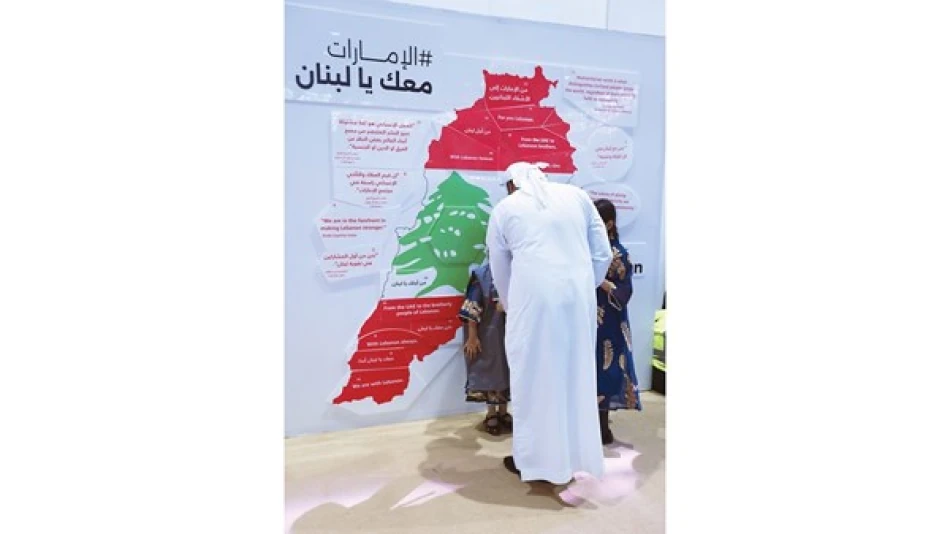
UAE Stands as Lebanon's Steadfast Ally Amid Political, Economic and Social Challenges
Lebanon's Historic Decision to Centralize Military Control Could Unlock Billions in International Investment
Lebanon's government has taken a pivotal step toward reclaiming state sovereignty by officially restricting weapons control to state institutions only—a decision that could finally unlock desperately needed international funding. Foreign Minister Youssef Raji confirmed that major financial institutions, including the World Bank and IMF, have made weapons centralization a non-negotiable condition for releasing aid to the crisis-stricken nation, alongside economic reforms to combat corruption.
A 35-Year Promise Finally Delivered
This weapons centralization represents the fulfillment of commitments made in the 1989 Taif Agreement, which ended Lebanon's devastating 15-year civil war. For over three decades, various armed groups—most notably Hezbollah—operated parallel military structures that undermined state authority and deterred international investment.
The decision required unprecedented coordination between Lebanon's presidency and government, supported by regional allies, particularly the UAE. According to Raji, Lebanese delegations have received warm receptions in the Emirates, signaling renewed Gulf confidence in Lebanon's direction under President Joseph Aoun's leadership.
International Investment Conditions Finally Met
The timing couldn't be more critical for Lebanon's collapsed economy. The country has been mired in one of the world's worst financial crises since 2019, with its currency losing over 95% of its value and banks largely frozen.
Two-Pronged International Requirements
Raji emphasized that international donors and financial institutions established two firm prerequisites for assistance: implementing economic reforms to eliminate corruption and waste, and centralizing weapons control under state authority. No funds or investments will flow until both conditions are met, he stated.
While investment amounts remain unspecified, comprehensive reconstruction and economic recovery plans await international donor conferences once state sovereignty is fully restored. This approach mirrors successful post-conflict reconstruction models seen in other Middle Eastern nations, where donor coordination proved essential for sustainable recovery.
Regional Realignment and Strategic Implications
Lebanon's pivot represents a broader regional realignment following recent geopolitical shifts. The country's previous governments damaged Arab relations through associations with parties holding hostile positions toward Gulf states—primarily referring to Hezbollah's Iran-aligned stance.
Border Demarcation Challenges Ahead
Raji outlined Lebanon's complex border situation, noting that boundaries with Israel have been established since the 1948 armistice but require formal demarcation through UN or US-mediated indirect negotiations. Lebanon demands immediate Israeli withdrawal from five occupied southern points and release of Lebanese prisoners before progress can occur.
Border demarcation with Syria presents technical challenges requiring joint committees, with Lebanon awaiting Syria's new administration to prioritize this file following recent political changes in Damascus.
Deeper Crisis Beyond Economics
The Foreign Minister characterized Lebanon's crisis as extending beyond financial and political dimensions to include an ideological component. Some parties operate based on transnational ideologies while certain leaders prioritize personal interests over national ones, creating avoidable external confrontations.
Market and Investment Perspective
For international investors and regional partners, Lebanon's weapons centralization decision signals potential market access to a historically strategic economic hub. However, sustainable investment requires not only security and stability but also legal and judicial guarantees protecting investor capital—frameworks that must be rebuilt from scratch.
The success of this sovereignty restoration could create a domino effect across the region, where other nations struggling with non-state armed groups might follow Lebanon's model. Regional stability often hinges on state monopolies over legitimate violence, making Lebanon's experiment crucial for broader Middle Eastern security architecture.
The Road to Regional Rebalancing
Lebanon's return to its natural role as an independent, active state within the Arab sphere could restore regional balance and offer Lebanese citizens hope for development-based prosperity rather than conflict-driven survival. The current government faces the monumental task of proving its ability to enforce rule of law across all Lebanese territory—a achievement that would mark a genuine turning point not just domestically, but for regional stability overall.
This critical juncture in Lebanese history demands that all political forces prioritize national interests over sectarian calculations, working collectively to rebuild state institutions and restore international confidence.
Most Viewed News

 Layla Al Mansoori
Layla Al Mansoori






